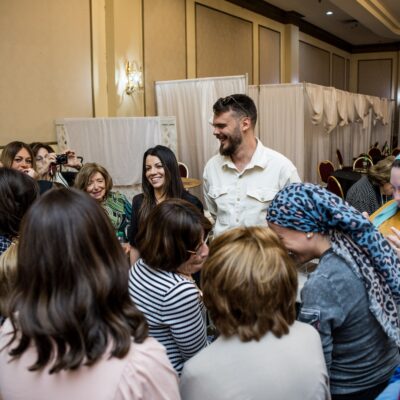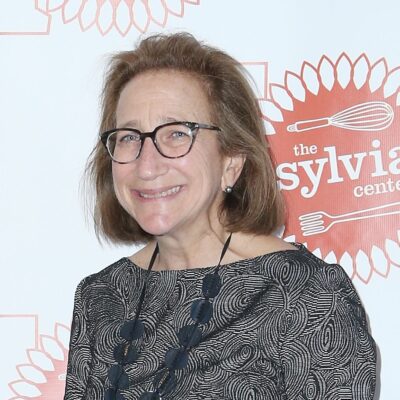Opinion
MORAL OBLIGATION
There is something you can do to protect the vulnerable
We are in the midst of incredibly turbulent times. It’s easy to get discouraged and be overwhelmed. But in the face of fear and uncertainty, Jewish philanthropy can offer something powerful: concrete help to those most in need. Among the most overlooked, but most urgent, needs is the growing economic insecurity within our own Jewish community.
A 2025 Jewish Federations of North America study showed that 29% of Jews cannot or are just managing to make ends meet. Ten percent receive government benefits (food assistance, subsidized housing or utilities, Medicaid, SSI), and 6% could not afford an unexpected expense of $1,000. These are people you know: your friend who just got divorced and now must support herself and her kids; your cousin who is struggling to pay mounting medical bills while fighting cancer; your great-aunt who is taking care of her husband and can’t hold down a job because of the caretaking demands; or your friend at shul who lost her government-funded job while her husband fears losing his, and they are trying to support their young kids.

Courtesy
Funders gathered at the PowerNet Investors Summit hosted by TEN: Together Ending Need and NJHSA in Denver.
The good news is that the Jewish community has always sought to take care of its own. Here in the United States and Canada, we have created a robust social services safety net. The Network of Jewish Human Service Agencies (The Network) is 180 organizations strong. These agencies focus on the needs of our most vulnerable, connecting them with food assistance, housing support and job training. The agencies also serve all families, helping with access to mental health resources and support with college expenses or a bridge loan when a business goes south. However, cuts in federal funding and related cuts at the state and local levels are severely impacting these agencies’ ability to keep this safety net strong. A full quarter of the agencies’ budgets are funded by the government. As this funding is cut, so too are their services, directly impacting millions in our community who will have even fewer places to go.
The Network’s “A Portrait of The Network” study in 2024, conducted by Rosov Consulting, found that across the sector, 51% of its clients identified as Jewish. This number rose when looking at smaller social service agencies to 64% of clients, with larger agencies serving about 43% Jewish clients. If the philanthropic community does not step up to fill the new gap in funding, the most vulnerable in our population will feel further abandoned as their ability to access health care, childcare and reliable food disappears.
In most cases, I do not like to use Jewish texts to prove a point, as our texts are deep and varied, and a proof text can usually be found to bolster any argument you make. However, in this case, our Jewish wisdom is unequivocally clear. We are obligated to care for the sick, the orphan, the widow and the vulnerable (Deuteronomy 14:29 and Deut. 24:17-21). Time and again throughout the ages, our texts lift up this obligation. It is this deeply held obligation that led the Jewish community to found our federation system and social services organizations. We look out for our own because we cannot depend on the rest of the world to do so. We created our own safety net. We cannot let it flounder.
Some may argue in this time of increased Jewish need, that because these agencies serve so many non-Jews, the Jewish philanthropic sector is justified in its prioritization of other “more Jewish” issue areas. This assertion hurts our community in three ways. First, it will allow Jews who cannot access services to suffer and feel greater isolation, which runs counter to our values. Second, while it’s true that in some cases agencies have become “vendors” of the state, doing so builds their capacity and allows them to provide programs to, say, Holocaust survivors. Third, it is simply the right thing to do. An added benefit of doing the right thing is that providing services to the non-Jewish population is a clear way to fight the current rise in antisemitism and build stronger and safer communities. Simply put, helping others builds bridges and relationships between communities. Someone who benefits from the support offered by a Jewish family service is given the opportunity to understand firsthand our people’s commitment to justice and chesed, overshadowing previous unfounded notions. Providing social services to the general population will not solve antisemitism alone, but in a world that misunderstands or maligns us, showing up for others is a form of protection as well as principle.
We shouldn’t abandon that power. In fact, data from Jewish Federations of North America shows that low-income Jews are twice as likely to be the victims of antisemitic attacks.
Our anxiety as a community is high. We fear rising antisemitism here at home, worry about our family and friends in Israel taking cover in their shelters, and many in our community are experiencing this while also being concerned that their budget will not stretch to cover the childcare they’ll need this summer.
As funders, let’s address these issues by taking positive action. Reach out to your local Jewish family service agency, Tomchei Shabbos or to The Network. Ask what support they need in this moment and work out a plan to provide it. Spread the word by encouraging your rabbi to speak about protecting the economically vulnerable this High Holiday season. TEN: Together Ending Need, a project of the Jewish Funders Network and The Harry and Jeanette Weinberg Foundation, has created a High Holiday Guide to help your rabbi speak on this issue. If you are an activist, lobby both your local, state and federal government representatives to continue to support social services.
In a moment of fear and uncertainty, taking meaningful action is our antidote. Let’s use it to remind the most vulnerable among us that they will not be alone.
Rabbi Rebecca W. Sirbu is the executive vice president of the Jewish Funders Network.













